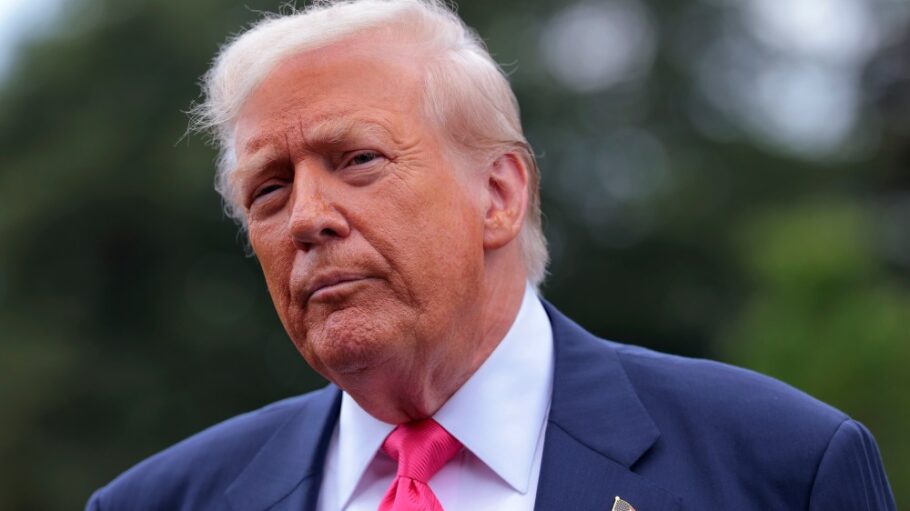President Donald Trump weighed in on the FCC‘s potential move to raise or eliminate the current 39% cap on local TV station owners — saying he opposes it if the result would be an “expansion of the fake news networks,” citing ABC News and NBC News specifically. But proposals for the FCC to remove the cap would not have any effect on the reach of national broadcast news networks, which today are available in virtually all U.S. TV households.
Trump’s remarks stand in contrast to the position of FCC chairman Brendan Carr, who was appointed by Trump. Carr has been a vocal advocate for abolishing the FCC’s decades-old rule limiting TV station groups from owning outlets that reach more than 39% of U.S. households. The National Association of Broadcasters also supports eliminating the cap.
Trump signaled he would oppose the move if it gave broader reach to “radical left” news networks.
“If [lifting the FCC’s 39% ownership cap] would also allow the Radical Left Networks to ‘enlarge,’ I would not be happy. ABC & NBC, in particular, are a disaster – A VIRTUAL ARM OF THE DEMOCRAT PARTY,” Trump wrote Sunday on his Truth Social account. “They should be viewed as an illegal campaign to the Radical Left. NO EXPANSION OF THE FAKE NEWS NETWORKS. If anything, make them SMALLER! President DJT.”
Trump included a link to a story quoting Christopher Ruddy, CEO of pro-Trump outlet Newsmax, as arguing that raising the FCC ownership limit would be a “disaster” for conservatives. “Reagan understood if you have left-wing networks like ABC, NBC and CBS — or groups like Nexstar today controlling every local station and their local news — Republicans would have little chance to win in state and federal elections,” Ruddy said, according to the article.
However, the elimination or raising of the 39% cap would not expand the reach of ABC News or NBC News — which are already available in every U.S. TV household. Instead, it would give more power to TV station group owners. And supporters of the move argue it would strengthen local TV journalism amid the growing influence of tech giants on the news media landscape.
Nexstar Media Group, seeking to clear its $6.2 billion deal for rival TV broadcast station group Tegna, officially filed applications last week with the FCC that include a request for a waiver of the agency’s 39% ownership cap for local TV broadcasters. Nexstar is the U.S.’s biggest local TV station owner, with 201 owned or partner stations in 116 markets. The deal for Tegna, which has 64 stations in 51 markets, would bring the combined company to 265 stations — and increase Nexstar’s reach to 54.5% of U.S. TV homes, over the FCC’s 39% ownership limit.
Love Film & TV?
Get your daily dose of everything happening in music, film and TV in Australia and abroad.
In a statement released Monday in response to Trump’s comments, Nexstar said, “We continue to believe that the landscape is ripe for regulatory reform and that we are on the path to completing our transaction. We agree with President Trump that the status quo is no longer acceptable, nor should the government do anything to strengthen the stranglehold of legacy media and Big Tech on the marketplace of ideas. Those platforms already reach into every pocket, purse and backpack in America, and the best way to disrupt their monopolistic power is to allow local broadcasters an opportunity to compete on a level playing field.”
Nexstar’s statement continued, “Americans want more access to local news and a variety of voices without the filter of the coastal elites. By modernizing the FCC’s rules, regulators will ensure that local communities benefit from an array of fact-based local journalism — the anti-fake news — for years to come. This is an historic opportunity to change the status quo and deliver a win for Americans across the country who are weary of legacy media’s leverage over local broadcasters.”
The FCC’s Carr also favors updating the 39% ownership cap rule. Speaking at the Milken Institute Global Conference in May, he reiterated his call for the agency to reform what he called “arcane artificial limits” on TV station ownership. The FCC in June launched a proceeding seeking public comment on whether to “modify, retain or eliminate” the 39% national audience reach cap on local TV ownership. The ownership cap has been in place since the 1980s, and was raised to the current 39% level in 2003.
In August, the NAB filed a request to the FCC to eliminate the 39% TV station ownership limit. The trade group said it “emphasized that the decades-old rule prevents local stations from achieving the scale needed to compete with global tech and streaming giants like Google/YouTube, Amazon, Meta and Netflix — none of which face similar restrictions.” NAB claimed “there is no credible justification for preserving an analog-era rule that no longer aligns with how Americans consume media or how advertising markets function.”
Nexstar, in announcing its applications to the FCC seeking approval for the Tegna takeover, said, “The applications address why, if certain of the FCC’s rules governing television ownership remain in effect, waiver of the rules would serve the public interest, especially in the local communities Nexstar’s stations will serve.”
Nexstar’s acquisition of Tegna is “vitally important to the future of local television and local journalism,” Nexstar chairman and CEO Perry Sook said in a Nov. 18 statement. “We are grateful that the Trump administration and the FCC recognize that the current television ownership regulations are outdated and do not reflect the competitive media landscape as it has evolved over the past 25-plus years. Like the Trump administration, we are focused on achieving deregulation, and we continue to advocate for the elimination of the antiquated constraints on local television ownership as the best solution to level the competitive playing field for all media.”
From Variety US































